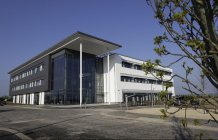Articles

Millions of pounds are being invested in and around Exeter to create an environment where business and industry can thrive.
Your University city is changing
Alumni based elsewhere who have visited Exeter recently may have noticed some prominent changes in and near the city. The University has undeniably grown but it is not alone. Find out more about how the Met Office’s new High Performance Computer, innovative science and new developments are turning the city into a successful knowledge economy.
Your view of Exeter will depend on when you left your University city. If you left recently, you will have already seen the seeds of change. If not, you might be surprised at statistics that show that 1 in 2 students predicted to get 3 A grades at A level now apply to Exeter. Only Oxford and Cambridge can better this. You might be similarly impressed when you hear Luke Lang from Exeter-based Crowdcube (the very first crowd-funding company in the world) say that he has no problem recruiting highly-skilled graduates. In fact he recently enticed an employee from Silicon Valley to relocate to the Exe Valley!
With the benefit of hindsight, it is obvious that developments at the University of Exeter in the last 10 years and the arrival of the Met Office in 2003 were both significant catalysts for further developments. In the recent years, the University has invested £200m into Research and Development into next generation science.
Millions of pounds too are being invested in and around Exeter to create an environment where business and industry can thrive. The £30m investment into the 24 hectare Exeter Science Park is now bearing fruit with the recent opening of phase one of the Exeter Science Park Centre (pictured). This is soon to be followed by the Met Office High Performance Computer and Global Environmental Futures Collaboration Centre which will be a new base for serious investment and innovative business. The Met Office’s £97m investment in high performance computing will bring benefits worth £2bn to the UK economy between 2016 and 2020 in the fields of climate research, renewables, aviation, flood prevention, food security and winter resilience.
Skypark Business Park will be a £210m sustainable business park with the potential to create 6,500 jobs. Meanwhile in Exeter’s city centre, plans for a £20m redevelopment that is focused on the bus and coach station are progressing. This will feature leisure facilities including a new swimming pool. £12m is currently being spent remodelling the Guildhall Shopping Centre.
The introduction of new hotels, better access roads and new housing has been important too. When finished, the new town of Cranbrook to the east of Exeter will be a community of up to 6,500 homes with a low carbon district heating network. Additional new construction within and to the west of Exeter is adding over 10,000 additional homes.
Exeter offers an excellent work/life balance. The Cathedral Green that you may have sat on whilst taking time out from studying still offers a pleasant sojourn from work matters. You can still walk, cycle or take a boat to the Double Locks or the Turf Hotel or hear great music in the city.
Exeter is getting ready for Rugby World Cup 2015. Some of you may have tickets for one or more of the three matches taking place at Sandy Park. Whenever you next come, as well as exploring your old haunts, check out what's changed!
visit www.investinexeter.co.uk for more news on how the city is changing.
Date: 28 July 2015
